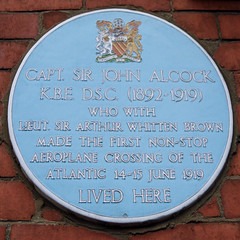Sir Captain John Alcock KBE DSC RN


Sir Captain John Alcock KBE DSC RN
(1892-1919)
Commemorated on 4 plaques
Capt. Sir John Alcock KBE DSC (1892 - 1919) who with Lieut. Sir Arthur Whitten Brown made the first non-stop aeroplane crossing of the Atlantic 14 - 15 June 1919 lived here.
6 Kingswood Road, Fallowfield, Manchester, United Kingdom where they lived
Sir John W. Alcock KBE DSC attended this school 1900-1905 with Sir Arthur W. Brown he made the first nonstop flight by aeroplane across the Atlantic June 14-15 1919
Heyhouses School, Lytham St Annes, United Kingdom where they attended school (1900-1905)
This memorial honours the achievement of John Alcock and Arthur Whitten-Brown the first men to fly non-stop across the Atlantic Ocean. On the morning of the fifteenth day of June Nineteen Hundred and Nineteen they landed their aircraft five hundred yards beyond the cairn which can be seen one and a half miles south of this point having left St John's, Newfoundland sixteen hours and twenty seven minutes before. The aircraft was a Vickers Vimy biplane powered by two Rolls-Royce Eagle VIII engines of three hundred and fifty horse power each and the average speed during the flight was one hundred and fifteen miles per hour.
by the coastline, Clifden, Ireland where they landed (1919)
This plaque was unveiled by Anne Alcock, niece of Sir John Alcock on 15th June 1994 to mark the 75th anniversary of the first non-stop transatlantic flight.
Co Galway, Clifden, Ireland where they was (199)




